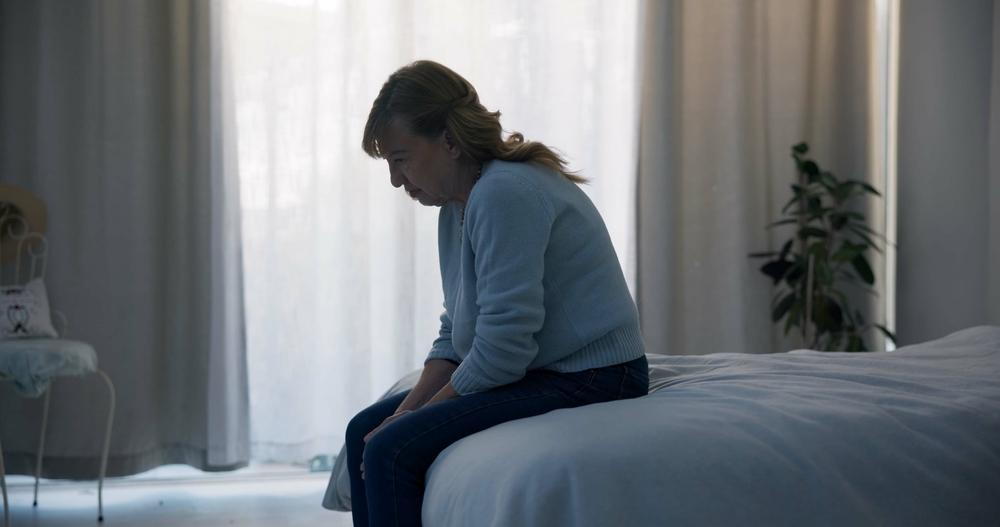
Anxiety-caused or worsened back pain affects countless Americans. The stressors of everyday life can catch up to you eventually, and when they do, you may feel them in the form of aches, pains, and muscle soreness throughout your body. This is especially true for those of us living busy and demanding lives, like many Triangle residents. As we’ll discuss later in this post, stress-caused or worsened back aches and pains can be exacerbated through periods of inactivity or a sedentary life cycle, adding to the pain burden of many office workers.
If you believe your back pain is triggered, caused, or worsened by anxiety, you may very well be correct, and you wouldn’t be alone. According to the Anxiety and Depression Association of America, “back pain is more common in people with anxiety and mood disorders than those without them.” Symptoms of anxiety-caused or worsened back pain can include sharp pains in the neck, back (upper or lower), back aches, and pain or soreness after activity or sitting for long durations.
Key Points:
In this article, we’ll discuss how you can relieve back pain from anxiety at home. We’ll also fill you in on when it’s in your best interest to turn to an experienced medical professional, such as a chiropractor, for more focused care. In our discussion, we’ll touch on the following:
- Whether anxiety can cause back pain,
- How anxiety affects your back, and
- How to relieve back pain from anxiety.
Can Anxiety Cause Back Pain?
If you suffer from anxiety, you likely know all too well that it can cause somatic (or bodily) symptoms. Beyond flushing, shakes, butterflies, and jitters, moderate to severe anxiety can and often does cause or worsen sharp pains and dull aches in the back and neck.

Many researchers believe that back pain caused by anxiety is typically “secondary,” which in essence means that while anxiety does not often directly cause back pain (in that it doesn’t deteriorate or cause structural damage to your back), it does cause behaviors which can in turn lead to back pain. Muscle tension, for example, is often caused or worsened by anxiety and other mood disorders. Muscle tension in turns leads to knotty muscles, potentially poor posture, and ultimately, back pain throughout your lower and/or upper back and neck.
How Anxiety Affects Your Back
- It exacerbates certain behaviors and existing conditions. As we alluded to above, anxiety can exacerbate a range of behaviors that lead to painful symptoms, including musculoskeletal conditions, migraines, muscle tightness, pain perception, and poor posture. The symptoms you experience will be unique to you, your past injuries or illnesses, your lifestyle, and more. These items should be discussed with an experienced medical professional, such as a chiropractor.
- It leads to reduced blood flow. Anxiety and high levels of stress in general can also lead to low blood pressure and reduced blood flow, including reduced blood flow to the muscles in our neck and back. A decreased blood supply weakens your body’s ability to heal, which worsens aches and pains. You may not know that you have low blood pressure, so it’s important to have your vital signs tested frequently.
- It deprives you of a good night’s sleep. Anxiety can leave you tossing and turning about factors and situations outside of your control, robbing you of the sleep your body desperately needs to heal and recover. It’s no secret that repeated lack of sleep leads to fatigue during the day, which in turn worsens or triggers back aches and pains.
- It can lead to prolonged periods of inactivity. Individuals experiencing anxiety and/or depression may find themselves staying in more frequently, reducing outdoor and active activities, and generally staying sedentary. The less you move, the weaker your muscles become—leaving you vulnerable to stiffness, aches, and pains throughout your back and neck.
How to Relieve Back Pain from Anxiety
- Address the underlying cause(s). Treating the underlying causes of your back pain is the best way to find relief. Anxiety may be worsening, or to some extent, causing your back pain symptoms; anxiety and other mood disorders should be handled by experienced mental health professionals.
- Seek help from a team of experienced back pain specialists. Some anxiety, however, is inevitable in life. Even at your calmest, you may still struggle with residual or even chronic back pain. Back pain that interferes with your daily activities or hampers your quality and enjoyment of life should be addressed promptly. At Team Chiropractic, our providers can use a variety of treatment options to ease your back pain, including spinal alignment, acupuncture, and targeted care to ease stiffness and restore joint mobility.
- Give yourself the care and attention you deserve. Before your appointment, there are several at-home methods to consider for the management of back pain. First, be mindful of posture. Check out our post, “8 Posture Tips for Sitting At a Desk All Day” for more. You might also consider ice or heat therapy and at-home stretches.
Bottom Line
Chiropractic care is one of the most common, trusted, and effective nonsurgical treatments for back pain. During your free initial consultation, your chiropractor can design a tailored treatment plan for your unique pain points, ultimately helping you reduce the pain and discomfort you deal with on a daily basis.
If you’re looking for chiropractic treatment in the greater Triangle area, Team Chiropractic & Sports Medicine, P.A. is your team of healthcare professionals.

With over 50 years of combined experience, we’re proud to serve Chapel Hill, Research Triangle Park, Durham, Raleigh, Clayton, and surrounding areas in North Carolina. Contact us online today or give us a call at 919-788-8881 to schedule your initial appointment and x-ray at either of our Triangle locations. We look forward to helping restore your health!

Anxiety-caused or worsened back pain affects countless Americans. The stressors of everyday life can catch up to you eventually, and when they do, you may feel them in the form of aches, pains, and muscle soreness throughout your body. This is especially true for those of us living busy and demanding lives, like many Triangle residents. As we’ll discuss later in this post, stress-caused or worsened back aches and pains can be exacerbated through periods of inactivity or a sedentary life cycle, adding to the pain burden of many office workers.
If you believe your back pain is triggered, caused, or worsened by anxiety, you may very well be correct, and you wouldn’t be alone. According to the Anxiety and Depression Association of America, “back pain is more common in people with anxiety and mood disorders than those without them.” Symptoms of anxiety-caused or worsened back pain can include sharp pains in the neck, back (upper or lower), back aches, and pain or soreness after activity or sitting for long durations.
Key Points:
In this article, we’ll discuss how you can relieve back pain from anxiety at home. We’ll also fill you in on when it’s in your best interest to turn to an experienced medical professional, such as a chiropractor, for more focused care. In our discussion, we’ll touch on the following:
- Whether anxiety can cause back pain,
- How anxiety affects your back, and
- How to relieve back pain from anxiety.
Can Anxiety Cause Back Pain?
If you suffer from anxiety, you likely know all too well that it can cause somatic (or bodily) symptoms. Beyond flushing, shakes, butterflies, and jitters, moderate to severe anxiety can and often does cause or worsen sharp pains and dull aches in the back and neck.

Many researchers believe that back pain caused by anxiety is typically “secondary,” which in essence means that while anxiety does not often directly cause back pain (in that it doesn’t deteriorate or cause structural damage to your back), it does cause behaviors which can in turn lead to back pain. Muscle tension, for example, is often caused or worsened by anxiety and other mood disorders. Muscle tension in turns leads to knotty muscles, potentially poor posture, and ultimately, back pain throughout your lower and/or upper back and neck.
How Anxiety Affects Your Back
- It exacerbates certain behaviors and existing conditions. As we alluded to above, anxiety can exacerbate a range of behaviors that lead to painful symptoms, including musculoskeletal conditions, migraines, muscle tightness, pain perception, and poor posture. The symptoms you experience will be unique to you, your past injuries or illnesses, your lifestyle, and more. These items should be discussed with an experienced medical professional, such as a chiropractor.
- It leads to reduced blood flow. Anxiety and high levels of stress in general can also lead to low blood pressure and reduced blood flow, including reduced blood flow to the muscles in our neck and back. A decreased blood supply weakens your body’s ability to heal, which worsens aches and pains. You may not know that you have low blood pressure, so it’s important to have your vital signs tested frequently.
- It deprives you of a good night’s sleep. Anxiety can leave you tossing and turning about factors and situations outside of your control, robbing you of the sleep your body desperately needs to heal and recover. It’s no secret that repeated lack of sleep leads to fatigue during the day, which in turn worsens or triggers back aches and pains.
- It can lead to prolonged periods of inactivity. Individuals experiencing anxiety and/or depression may find themselves staying in more frequently, reducing outdoor and active activities, and generally staying sedentary. The less you move, the weaker your muscles become—leaving you vulnerable to stiffness, aches, and pains throughout your back and neck.
How to Relieve Back Pain from Anxiety
- Address the underlying cause(s). Treating the underlying causes of your back pain is the best way to find relief. Anxiety may be worsening, or to some extent, causing your back pain symptoms; anxiety and other mood disorders should be handled by experienced mental health professionals.
- Seek help from a team of experienced back pain specialists. Some anxiety, however, is inevitable in life. Even at your calmest, you may still struggle with residual or even chronic back pain. Back pain that interferes with your daily activities or hampers your quality and enjoyment of life should be addressed promptly. At Team Chiropractic, our providers can use a variety of treatment options to ease your back pain, including spinal alignment, acupuncture, and targeted care to ease stiffness and restore joint mobility.
- Give yourself the care and attention you deserve. Before your appointment, there are several at-home methods to consider for the management of back pain. First, be mindful of posture. Check out our post, “8 Posture Tips for Sitting At a Desk All Day” for more. You might also consider ice or heat therapy and at-home stretches.
Bottom Line
Chiropractic care is one of the most common, trusted, and effective nonsurgical treatments for back pain. During your free initial consultation, your chiropractor can design a tailored treatment plan for your unique pain points, ultimately helping you reduce the pain and discomfort you deal with on a daily basis.
If you’re looking for chiropractic treatment in the greater Triangle area, Team Chiropractic & Sports Medicine, P.A. is your team of healthcare professionals.

With over 50 years of combined experience, we’re proud to serve Chapel Hill, Research Triangle Park, Durham, Raleigh, Clayton, and surrounding areas in North Carolina. Contact us online today or give us a call at 919-788-8881 to schedule your initial appointment and x-ray at either of our Triangle locations. We look forward to helping restore your health!
Contact Us
Raleigh Office
309 W Millbrook Rd STE 199
Raleigh, NC 27609
Hours:
Monday: 7:30AM–12PM & 3PM–6PM
Tuesday: 7:30AM–12PM & 3PM–6PM
Wednesday: 7:30AM–12PM
Thursday: 7:30–12PM & 3PM–6PM
Friday: 7:30AM–12PM
Saturday & Sunday: Closed
Wakefield Office
12740 Spruce Tree Way STE 103
Raleigh, NC 27614
Hours:
Tuesday: 7:30AM–12PM
Wednesday: 7:30AM–12PM & 3:15–6:00PM
Thursday: 3:15-6:00PM
Friday: 7:30AM–12PM
Saturday & Sunday: Closed

